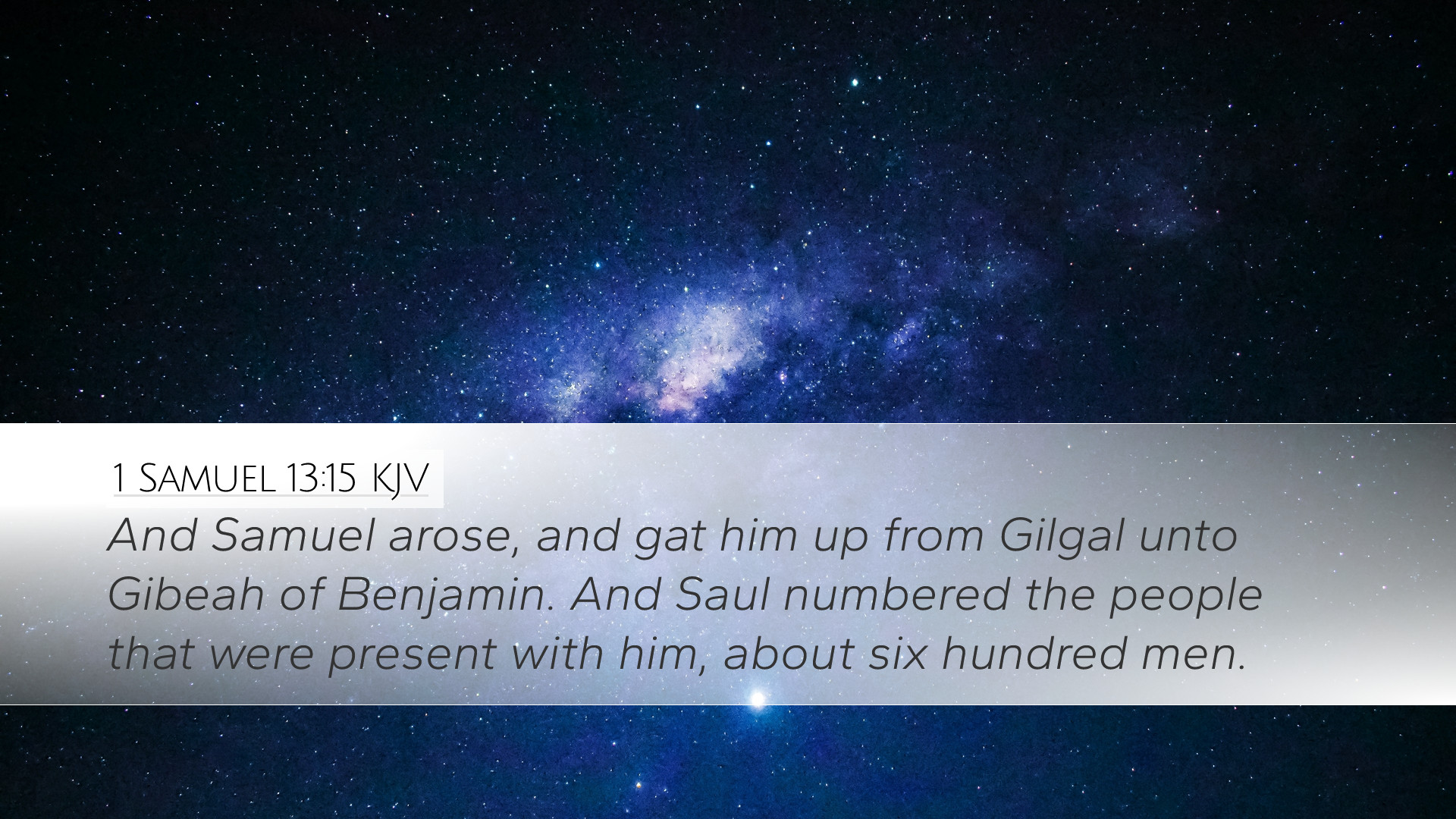Commentary on 1 Samuel 13:15
Verse Reference: 1 Samuel 13:15
This verse reads: "And Samuel arose, and gat him up from Gilgal unto Gibeah of Benjamin; and Saul numbered the people that were present with him, about six hundred men."
Contextual Overview
The backdrop of 1 Samuel 13 is vital for understanding the gravity of the events that unfold. Saul, Israel’s first king, faced a critical juncture in his kingdom's life. The Philistines threatened Israel, leading to a significant military confrontation. Saul had waited for Samuel to offer sacrifices before engaging in battle, as the latter had previously indicated the necessity of divine blessing for victory.
Insight into Samuel's Role
Samuel’s Authority: Samuel, the prophet and judge, plays a pivotal role in Israel’s theocratic governance. His arrival is not merely ceremonial, but it embodies the spiritual leadership essential for Israel’s success against its enemies.
Samuel’s Timing: There is an indication of divine timing in this passage. Saul’s action in moving forward without Samuel’s blessing leads to critical spiritual implications for his reign.
Exegesis of the Verse
The movement of Samuel from Gilgal to Gibeah signifies a transition—a departure from the expectation of prophetic guidance to Saul’s increasingly autonomous decisions. The fact that Samuel ‘arose’ suggests a divine imperative driving his action, perhaps a response to Saul's inappropriate handling of the situation.
Analysis of Saul’s Situation
The Fear of the People: Saul’s decision to number the soldiers indicates a strategic move born out of fear. The growing unrest among the Israelites and the intimidation from the Philistines pressured Saul into action. He faltered in faith, as he did not wait for Samuel as ordained.
Military Strength: The mention of “about six hundred men” reflects a significant reduction in military strength, as many had deserted or fled due to fear of the impending conflict. The disparity between the Israelite forces and their Philistine adversaries was stark, emphasizing Saul’s precarious position.
Theological Implications
This passage calls attention to the necessity of obedience and the repercussions of disobedience.
- Divine Sovereignty: The unfolding events reiterate God’s sovereignty over Israel. Samuel’s role is critical in acknowledging that divine intervention is necessary for victory.
- Leadership Accountability: Saul’s act of taking upon himself the priestly duty showcases a failure in understanding the roles prescribed by God. As leaders, spiritual and temporal responsibilities must not be confused.
- Trust in God’s Timing: Patience in divine promises is outlined here. The failure to wait for Samuel signifies a lack of trust in God's timing and leads to disobedience with longstanding consequences.
Historical Interpretation
Historians often contextualize Saul’s actions through the lens of leadership crises in ancient Near Eastern cultures, where waiting for divine approval before battle was a common practice. Samuel’s hesitance in arriving could have been perceived as a divine delay, testing Saul’s faith.
Comparative Analysis with Other Biblical Figures
Saul’s impatient actions can be contrasted with figures like Moses, who waited for God’s command before acting. This comparison serves as a reminder of the weight of divine timing and the risks of acting presumptively.
Lessons for Contemporary Christian Leadership
The implications of Saul’s decisions resonate deeply with modern Christian leadership. Pastors and church leaders must learn from Saul’s haste and the importance of seeking divine counsel before making decisions.
- Emphasis on Prayer and Waiting: Christian leaders are called to be patient, seeking God’s wisdom in all decisions rather than relying solely on human rationale.
- Understanding Roles: Leaders must recognize their God-given roles and respect spiritual authority, ensuring alignment with divine directives.
- Trusting God in Adversity: The ability to trust God in moments of uncertainty enhances spiritual maturity and fosters a climate of faith among congregants.
Conclusion
1 Samuel 13:15 serves as a crucial reminder of the importance of divine timing, the necessity for spiritual authority, and the vital role of obedience in leadership. The consequences of Saul's actions unfold dramatically throughout the narrative and provide a lens for evaluating our actions as leaders and believers today.


